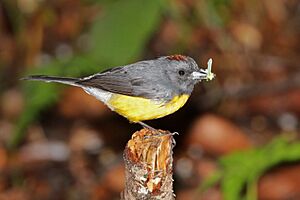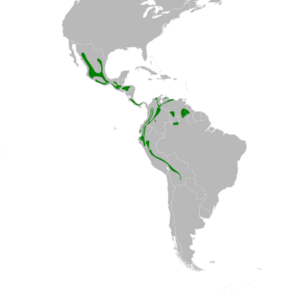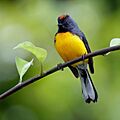Slate-throated whitestart facts for kids
Quick facts for kids Slate-throated whitestart |
|
|---|---|
 |
|
| Myioborus miniatus aurantiacus in Panama | |
| Conservation status | |
| Scientific classification |
|
| Kingdom: | Animalia |
| Phylum: | Chordata |
| Class: | Aves |
| Order: | Passeriformes |
| Family: | Parulidae |
| Genus: | Myioborus |
| Species: |
M. miniatus
|
| Binomial name | |
| Myioborus miniatus (Swainson, 1827)
|
|
 |
|
| Range of M. miniatus | |
| Script error: The function "autoWithCaption" does not exist. | |
Script error: No such module "Check for conflicting parameters".
The slate-throated whitestart (Myioborus miniatus) is a small, colorful bird. It is also sometimes called the slate-throated redstart. This bird lives in Central and South America. It belongs to the Parulidae family, which are often called New World warblers.
Contents
About the Slate-throated Whitestart
This warbler has a long tail and is about 12 cm (4.7 in) long. It has a reddish-brown head and a dark back. Its chest and belly are bright yellow. The tips of its tail feathers are white, and its underside near the tail is also white. It has a black beak and dark gray legs.
Most of these birds look very similar across their wide home range. However, the color of their belly can change. In most places, it is yellow. But in the northern parts of its range, the belly can be red.
Where They Live
You can find the slate-throated whitestart in different areas. They live in humid mountain forests. They prefer the middle and upper parts of the forest, called the canopy. Their home stretches from Mexico through Central America. They also live in the Andes mountains, from western Venezuela to northwestern Argentina. Other places they live include the Venezuelan Coastal Range, the Sierra Nevada de Santa Marta, and flat-topped mountains called tepuis. These birds usually live at heights between 600 to 2,500 m (2,000 to 8,200 ft) above sea level.
How They Behave
Slate-throated whitestarts often stay with their partner all year long. They sometimes join groups of different bird species. They move quickly, hopping and fluttering around. As they move, they flash their tails. This action helps to scare up insects. Once the insects fly, the bird chases and catches them in the air. Sometimes, they also eat small protein bits from Cecropia plants. They might also pick insects off tree bark.
The call of this bird is a sharp "pik" sound. Their song changes depending on the area. But usually, it is a series of whistled notes. Some notes go up, and some go down.
Life Cycle and Reproduction
From April to May, pairs of these birds build their nests. The nest is large and has a roof with an opening on the side. They usually build it in a hidden spot, like a niche in a bank or a steep slope. The female bird lays 3, or sometimes 2, white eggs with speckles on them.
Gallery
 | Selma Burke |
 | Pauline Powell Burns |
 | Frederick J. Brown |
 | Robert Blackburn |





